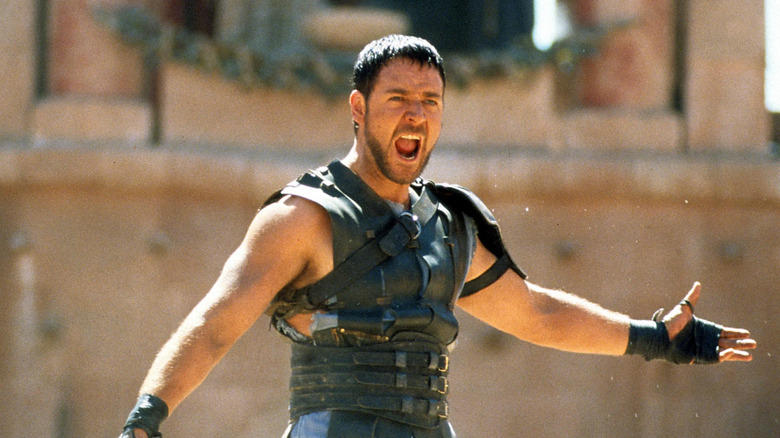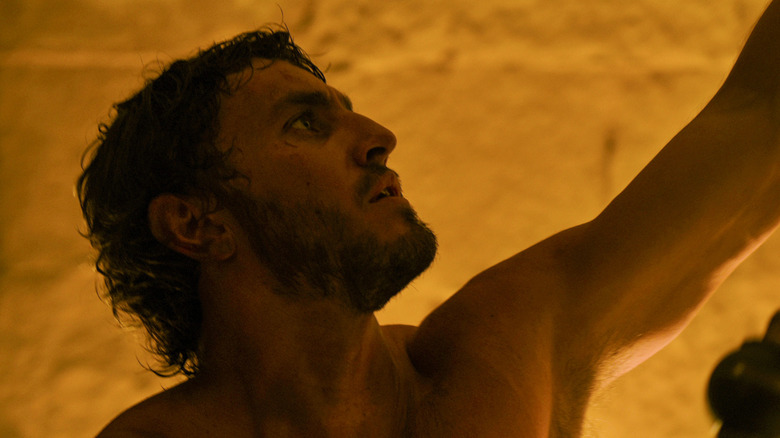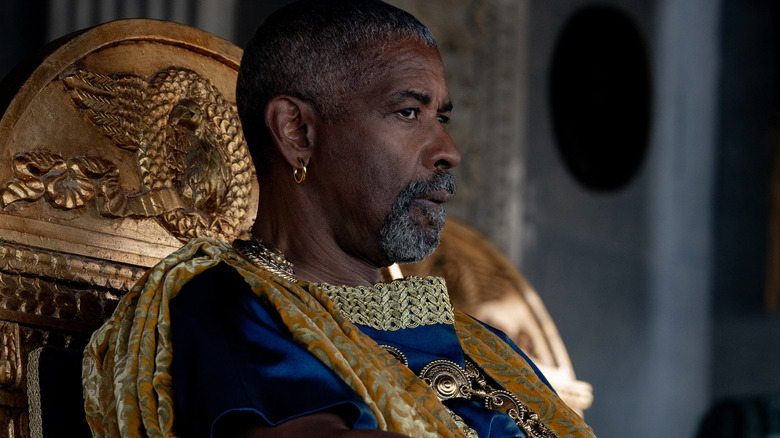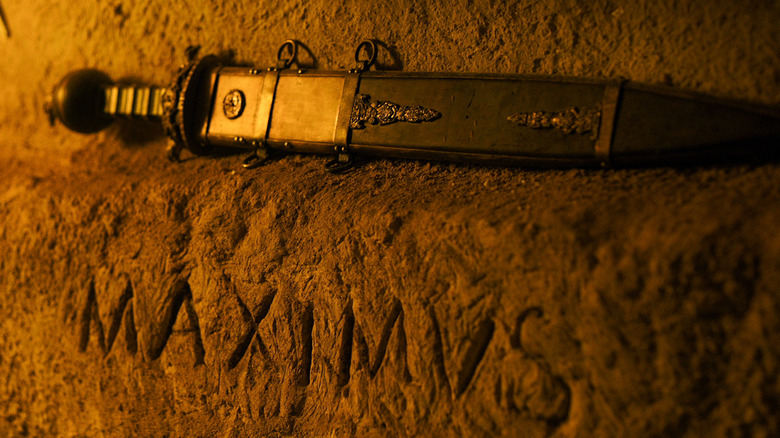Gladiator 2 Is Haunted By The Specter Of Russell Crowe's Maximus
Spoilers for "Gladiator II" follow.
There were so many hurdles Ridley Scott would inevitably encounter by daring to return to ancient Rome with "Gladiator II." How could the legendary filmmaker pull off a follow-up to his Oscar-winning epic? Well, the second Paul Mescal — who is appointed to carry on swinging the sword as the Colosseum's newest star — shuffles sand between his hands, there's no doubt that the spectacle audiences loved in the first chapter has returned. There's also plenty of backstabbing and power trips at play thanks to the scene-devouring Denzel Washington. And yet, even with all the blood, gore, and historically inaccurate CGI sharks, the unavoidable truth about "Gladiator II" is that it can't shake itself from the shadow of it's forgotten hero: Maximus Decimus Meridius, the general that became a slave, the slave that became a gladiator, and the gladiator that earned Russell Crowe a shiny gold statue for his troubles.
In its opening moments the film wastes no time reminding us of what came before, thanks to a vibrant title sequence that gives some of the star's pivotal scenes from "Gladiator" a striking coat of paint. There's Crowe's iconic turn to the camera before laying into his "My name is Maximus" speech, as well as the hair-raising showdown with Joaquin Phoenix's wreath-wearing weasel, Commodus. What's perhaps so frustrating about this is that while there are enough pieces in "Gladiator II" to make a whole new puzzle, it chooses to force in old ones that Crowe handled so much better.
In case you were wondering: no, Russell Crowe doesn't make new appearance in "Gladiator II." Some footage of him from the original movie is reused here and there, but this is a movie about a brand new character. And yet, the actions of Crowe's Maximus continue to overshadow everything that happens here.
Paul Mescal can't compete with Russell Crowe
Stop me if you've heard this one before. A husband to a murdered wife is sold into slavery, becomes a gladiator, and is forced to fight to get close to the man that killed her. Comparisons between both films were inevitable, but by essentially recycling the plotline from the original movie, they become even greater, and the star of "Gladiator II" suffers because of it.
Try as he might, Paul Mescal, who plays main character Lucius, lacks the charm and gravitas Crowe had in spades, simply because there's not enough going on around the newcomer to try and match it. The 2000 film's full focus was on Crowe's stoic Spaniard and therefore gave viewers plenty more time to get to know and connect with the Roman general whose screen time takes up just under half the film.
Lucius doesn't get that opportunity. He might fill the quota of fight sequences, dodging rhinos and biting baboons, but it's not enough. Instead, the "Normal People" star is left yelling at his estranged mother or quoting lines from the previous film to hit the audience in the feels. Mescal wastes time talking about "strength and honor" or seeking vengeance "in this life or the next" showing just how undercooked his character's story is by pulling from pages of the previous one. In doing so, it highlights that the other going on in "Gladiator II" are where the focus should have been from the start.
Gladiator II needed more Macrinus and less Maximus
Look at just about any review of "Gladiator II" and it comes as absolutely no shock that Denzel Washington is getting all the praise as the villainous Macrinus, and rightfully so. With a flick of his robes, the two-time Oscar winner elevates any scene he's in, sometimes without saying a word. A passing glance as the powers of Rome begin to buckle show that his cogs are turning three times faster than anyone else's. The problem is that he in turn lifts attention away from Lucius' story, and highlights that unlike the first "Gladiator," the battle isn't in the arena of the Colosseum, but in the stands and even outside of it, where our hero is rarely seen. Had the focus stayed there from the start, it could've worked in Mescal's favor and everyone else's.
Lucius didn't have to follow in his father's footsteps, but rather be a young Emperor walking his own path, fighting for "the dream that was Rome," until a new nightmare arrives in the form of Macrinus. Taking this route would have built up to a deserving showdown between the two. One that gave the young leader time to sit with uncovered family secrets, shocking deaths (Connie Nielsen deserved better), and earn the hero status he never really obtains here. But if the sequel took that approach, would it really be a "Gladiator" movie anymore? Probably not, but Scott is a skilled enough filmmaker to have made it happen. But current Hollywood trends stop him from doing so. Rather than forge a new path, "Gladiator II" keeps recreating beats from the original film, and that ultimately reminds us that the original film was better.
IP demands haunt Gladiator II just as much as Russell Crowe
As it stands, "Gladiator II" is off to a great start at the box-office, becoming Ridley Scott's most successful opening weekend ever. Given his recent track record, it was a payday the filmmaker was in desperate need of. The likes of "The Last Duel" and "Napoleon" failed to draw in crowds, with the director blaming millennials for not going to the cinema in the former's case. With that in mind, would a "Gladiator" sequel without an actual gladiator in it suffer the same fate? Maybe — and maybe that's the problem.
In an era where intellectual properties ensure a win to keep the Hollywood machine running more than anything, a "Gladiator" sequel in all but name only is perhaps something that very few would bet on. Even less so when its most identifiable character can't return on account of being dead. The only sensible course of action would be to keep the new blood playing a familiar game (however limited his presence might be), jangling the rusty old keys of the Colosseum and harking back to Russell Crowe's hero any chance it gets.
Ultimately, there's undoubtedly a good film in "Gladiator II," but there could've been a great one had it taken a different leaf out of the previous movie's playbook. Give the crowd something they've never seen before and "Gladiator II" could've won its creative freedom.



